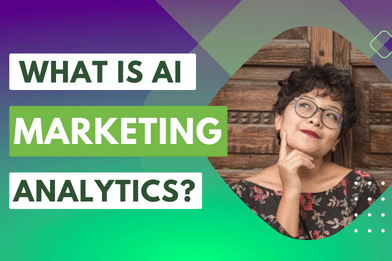In the rapidly evolving landscape of digital marketing, staying ahead requires more than just intuition and guesswork. Enter AI marketing analytics, a game-changing approach that has transformed the way marketers operate.
Read on to delve into the depths of AI-driven marketing analytics, exploring its core concepts, benefits, and real-world examples. By the end of this article, you’ll have a solid understanding of how AI is reshaping marketing strategies and enabling marketers to make data-driven decisions that propel businesses forward.
Understanding AI Marketing Analytics
What does “AI Marketing Analytics” refer to?
At its core, AI marketing analytics involves the utilization of artificial intelligence and machine learning algorithms to analyze vast amounts of data sourced from various marketing channels. This data includes customer interactions, engagement metrics, advertising performance, and more. By extracting valuable insights and patterns from this data, AI empowers marketers to optimize their campaigns, personalize their strategies, and predict consumer behavior.
How AI is Used in Marketing Analytics
AI is employed to streamline and automate various tasks that were previously time-consuming and prone to human error. By processing and analyzing data at an unprecedented speed, AI tools provide marketers with actionable insights that guide their decisions. For example, AI can analyze customer preferences and behaviors to recommend personalized content or products, enhancing engagement and increasing ROI.
Possible Benefits of AI Marketing Analytics
Enhanced Efficiency
AI tools can process vast amounts of data in a fraction of the time it would take a human analyst. This efficiency allows marketers to quickly gather insights, identify trends, and adjust their strategies accordingly. Tasks that used to require hours or even days can now be completed in a matter of minutes, freeing up valuable time for more strategic planning.
Data-Driven Decision Making
Marketers are no longer reliant solely on intuition and past experience. With AI marketing analytics, decisions are backed by data-driven insights. By analyzing historical and real-time data, AI algorithms can predict consumer behavior, enabling marketers to tailor their strategies to meet evolving customer demands.
Personalization and Customization
One of the most powerful applications of AI in marketing is personalization. AI algorithms analyze individual customer preferences, behaviors, and interactions to create hyper-targeted campaigns. For instance, an AI-powered system can recommend products to customers based on their past purchases and browsing history, creating a highly personalized shopping experience.
Predictive Algorithms
AI marketing analytics thrives on predictive algorithms. These algorithms forecast future trends and outcomes based on historical data. Marketers can use these predictions to optimize campaigns, allocate resources effectively, and anticipate market changes.
Real-Life Example: Google’s AI-Powered Recommendations
Google’s search and advertising platform is a prime example of how AI marketing analytics can enhance user experiences and drive revenue. Google uses AI algorithms to analyze users’ search histories and online behaviors. This analysis enables Google to provide personalized recommendations and advertisements, increasing user engagement and click-through rates.
The Role of Machine Learning in AI Marketing Analytics
Machine learning is a subset of AI that plays a vital role in marketing analytics. It involves the use of algorithms that can learn from data, identify patterns, and make predictions without being explicitly programmed. In marketing, machine learning algorithms can automate processes like customer segmentation, sentiment analysis, and lead scoring.
How Marketers Use AI Marketing Analytics
Optimizing Marketing Campaigns
AI tools can analyze historical campaign data to identify which strategies have been the most effective. Marketers can then use this information to refine and optimize their future campaigns for maximum impact. This analysis provides marketers with actionable insights into which specific strategies and components of past campaigns have yielded the most favorable results.
For instance, AI might reveal that certain types of content perform better with particular audience segments, or that campaigns launched during specific time frames generate higher engagement rates.
Armed with this knowledge, marketers can make well-informed decisions to refine and optimize their future campaigns, tailoring them to resonate more effectively with their target audiences.
Enhancing Customer Engagement
AI-driven insights enable marketers to create content that resonates with their target audience. By understanding customer preferences and behaviors, marketers can deliver more relevant and engaging content through various marketing channels.
Automating Repetitive Tasks
AI marketing analytics can automate tasks like data collection, analysis, and reporting. This automation frees up marketers’ time, allowing them to focus on strategic planning and creative tasks.
Data collection involves gathering vast amounts of information from various sources such as social media, websites, customer interactions, and sales data. AI algorithms can efficiently aggregate and organize this data, eliminating the need for manual data entry and reducing errors.
The analysis phase entails interpreting the collected data to extract valuable insights and patterns. AI-powered analytics can quickly process and analyze large datasets, identifying trends, customer behaviors, and performance metrics that might have gone unnoticed through manual analysis. This enables marketers to make more informed decisions and refine their strategies.
Generating Personalized Recommendations
AI algorithms analyze customer data to generate personalized recommendations, whether it’s suggesting products, content, or services. This level of personalization enhances the customer experience and increases the likelihood of conversions.
By employing techniques like machine learning and data mining, these algorithms can extract meaningful patterns and insights from the data. This enables businesses to generate tailored recommendations for individual customers in real-time.
Best AI Marketing Tools: Our Top Picks
|
3.5
|
3.5
|
3.5
|
Conclusion: Unveiling the Future of Marketing Analytics

AI marketing analytics has become an indispensable tool in a marketer’s arsenal. Its ability to analyze vast amounts of data, generate insights, and predict outcomes has transformed the way marketing strategies are formulated and executed. By harnessing the power of AI, marketers can create personalized experiences, optimize their team’s campaigns, and make data-driven decisions that boost ROI and drive revenue.
As technology continues to advance, the role of AI in marketing analytics is only set to expand, enabling marketers to stay ahead in an ever-evolving digital landscape. Delve into a wide range of articles from our collection. Visit our blog now and learn more about AI Marketing Tools. This compilation functions as a repository of knowledge, providing a wide range of viewpoints that collectively enhance one’s comprehension of the topic at hand.
FAQS
Q: What is Artificial Intelligence Marketing Analytics?
A: Artificial Intelligence Marketing Analytics refers to the use of artificial intelligence technology in analyzing marketing data and providing insights and recommendations to improve marketing strategies and campaigns.
Q: How does artificial intelligence play a role in marketing analytics?
A: Artificial intelligence allows for the automation and optimization of marketing processes. It can analyze large amounts of data, identify patterns and trends, and provide actionable insights to enhance marketing efforts.
Q: What are the benefits of using AI in marketing analytics?
A: The use of AI in marketing analytics can lead to more accurate and insightful data analysis, better targeting of customers, improved personalization, enhanced customer experience, and increased ROI.
Q: How can AI-powered tools assist in marketing analytics?
A: AI-powered tools can automate data collection, analysis, and reporting tasks, saving time and effort for marketers. These tools can also provide real-time insights, predict customer behavior, and optimize marketing campaigns for better results.
Q: How can AI be used to optimize customer relationship management?
A: AI can be used to unify and analyze customer data from multiple sources, allowing for a comprehensive view of the customer. This helps in identifying customer preferences, improving customer segmentation, and tailoring marketing strategies to effectively engage and retain customers.
Q: What are some examples of AI being used in marketing analytics?
A: AI is being used in various ways in marketing analytics. For instance, AI-powered chatbots are used to provide personalized customer service and promote products. AI is also utilized in speech recognition for natural language input and in data security to ensure customer information is protected.
Q: How can AI help in improving the buying experience for customers?
A: AI can analyze customer behavior and preferences to provide personalized product recommendations and offers, enhancing the buying experience. It can also optimize pricing strategies, streamline the checkout process, and offer virtual shopping assistants to guide customers in their buying decisions.
Q: How does AI contribute to the innovation of marketing strategies?
A: AI can analyze vast amounts of data, identify patterns, and generate predictive insights to inform marketing strategies. By understanding customer preferences and market trends, marketers can make more informed decisions and develop innovative approaches to reach and engage their target audience.
Q: What are the implications of AI in marketing analytics for e-commerce businesses like Amazon?
A: AI is instrumental in e-commerce businesses like Amazon. It enables advanced product recommendation systems, personalized shopping experiences, efficient inventory management, and targeted marketing campaigns that contribute to Amazon’s success in delivering a superior customer experience.
Q: How can AI-driven marketing analytics improve customer service?
A: AI can be used to provide automated customer support through chatbots and virtual assistants, addressing customer queries and resolving issues in real-time. This improves response time, ensures consistent service quality, and frees up human resources for more complex customer interactions.











